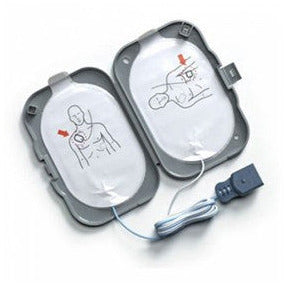The Philips Heartstart FR3 defibrillator with ECG is designed to be faster, easier and better at providing post-cardiac arrest care to its patients.
For a professional-grade defibrillator, it is one of the best on the market among its competitors.
With an IP55 rating, the unit is robust, reliable and well-protected against dust particles and jetting water streams. Making it the perfect defibrillator for all weather types.
Key Features
- Aides with two treatments: electro-shock therapy or CPR chest compressions
- SMART CPR provides guidance on the treatment the patient will benefit most from first
- Philips Quick Shock reduces the amount of time between compressions and shock therapy
- Smallest and lightest professional grade AED on the market
- Tested to US Military standards
- Battery life for up to 300 life saving shocks/12 hours of patient monitoring
- Performs daily, weekly and monthly automated self-tests so the unit is always rescue ready
- CPR Metronome keeps the beat consistent for applying chest compressions
Please advise that the unit comes with Defibrillator, primary battery one set of SMART pads III, set up guide and CD-Rom. No unit is included. Please see following links for unit options:
https://www.medisave.co.uk/philips-small-soft-case-w-o-auto-on-fr3.html
https://www.medisave.co.uk/philips-system-case-rigid-fr3.html
Philips Unique Features
ECG Analysis – The Heartstart FR3 with ECG model comes with an analysis system. It checks the electrode pads are firmly applied to the patient’s skin. It evaluates both the ECG rhythm and the signal quality to determine if a shock is appropriate. And it identifies any item which may interfere with the electro-shock therapy such as a pacemaker.
Philips Data Management Solutions – Philips tools make the process of extracting data and ECG readings easier for the medical professional. The device can transmit data via Bluetooth or an FR3 data card to give emergency services the latest evaluations of the patient. This is key in the minutes after someone suffers a sudden cardiac arrest: the quicker the patient gets the right care, the better their chances of survival.

























